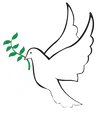Restorative communities in schools:
Since its founding, the Topeka Center for Peace and Justice (TCPJ) has been committed to the principles of restorative justice, including:
● Build community relationships.
● Resolve conflict through dialogue and creative problem-solving.
● Focus on repairing harm when it occurs.
● Give victims a voice in the process of justice.
Using restorative justice practices can lead to more sustainable solutions for interpersonal problems.
Restorative Practices in schools is a cultural change. The Circle Practice provides a safer climate while teaching students important life skills in communication and conflict resolution. Building community through the circle process is a proactive approach to school discipline.
When discipline problems do occur, the restorative questions defuse the situation and hold the students accountable for their behavior.
Typical Restorative Questions in response to challenging behavior are:
What happened?
What were you thinking at the time?
What have you thought of since?
Who has been affected by what you have done? In what way?
What do you think you need to do to make things right?
Question to help those harmed by others' actions:
What did you think when you realized what had happened?
What impact has this incident had on you and others?
What has been the hardest thing for you?
What do you think needs to happen to make things right?
TCPJ continues to train educators and to support schools in a variety of ways that promote restorative climates in the school.
Since its founding, the Topeka Center for Peace and Justice (TCPJ) has been committed to the principles of restorative justice, including:
● Build community relationships.
● Resolve conflict through dialogue and creative problem-solving.
● Focus on repairing harm when it occurs.
● Give victims a voice in the process of justice.
Using restorative justice practices can lead to more sustainable solutions for interpersonal problems.
Restorative Practices in schools is a cultural change. The Circle Practice provides a safer climate while teaching students important life skills in communication and conflict resolution. Building community through the circle process is a proactive approach to school discipline.
When discipline problems do occur, the restorative questions defuse the situation and hold the students accountable for their behavior.
Typical Restorative Questions in response to challenging behavior are:
What happened?
What were you thinking at the time?
What have you thought of since?
Who has been affected by what you have done? In what way?
What do you think you need to do to make things right?
Question to help those harmed by others' actions:
What did you think when you realized what had happened?
What impact has this incident had on you and others?
What has been the hardest thing for you?
What do you think needs to happen to make things right?
TCPJ continues to train educators and to support schools in a variety of ways that promote restorative climates in the school.
